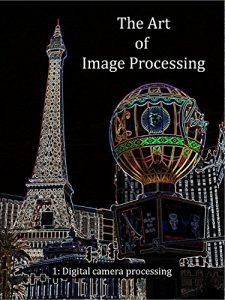This book is about Image Processing.
It is the first in a short series. This one discusses image processing for photographs. It explains how digital cameras work, and the basic processing that leads to a pleasing image being displayed for viewing.
Digital camera, photo processing and display technology have their base in the realistic painting of the Renaissance, the later exploration of color and shade by the Impressionists, and investigations into the science of human vision late in the Age of Enlightenment. These origins tend to be obscured by the technical detail but they are encoded into the standards and the processing tools and technology. In this book I relate these artistic and scientific origins to the modern technology that has developed from them.
Renaissance realism was concerned with rendering scenes that could be seen - things that you could have looked at, captured with the aim of being viewed. Leonardo da Vinci described realistic painting as:
“a subtle invention, which with philosophical and subtle speculation considers all manner of forms: sea, land, trees, animals, grasses, flowers, all of which are enveloped in light and shade”
and this book focuses on image processing whose aim is to produce a pleasing picture that is obviously of some thing.
I have deliberately avoided a mathematical treatment and left the topic of compression - which is unavoidably mathematical - to two later books. As with other books in the “Art of” titles, this eBook – written specifically for the Amazon Kindle – is meant to be read as you would a novel: starting at the beginning, reading through in sequence, following the narrative. Not stopping to make notes, nor working through exercises or assignments, just reading it for enjoyment and to gain a first understanding of the subject.
The highly visual and colorful nature of the subject means you will gain much more from viewing this book on a Kindle viewer that supports color.
There are two other books in this series:
Still image compression
Digital video compression
and one companion book about the related topic of Digital Signal Processing:
The Art of DSP
It is the first in a short series. This one discusses image processing for photographs. It explains how digital cameras work, and the basic processing that leads to a pleasing image being displayed for viewing.
Digital camera, photo processing and display technology have their base in the realistic painting of the Renaissance, the later exploration of color and shade by the Impressionists, and investigations into the science of human vision late in the Age of Enlightenment. These origins tend to be obscured by the technical detail but they are encoded into the standards and the processing tools and technology. In this book I relate these artistic and scientific origins to the modern technology that has developed from them.
Renaissance realism was concerned with rendering scenes that could be seen - things that you could have looked at, captured with the aim of being viewed. Leonardo da Vinci described realistic painting as:
“a subtle invention, which with philosophical and subtle speculation considers all manner of forms: sea, land, trees, animals, grasses, flowers, all of which are enveloped in light and shade”
and this book focuses on image processing whose aim is to produce a pleasing picture that is obviously of some thing.
I have deliberately avoided a mathematical treatment and left the topic of compression - which is unavoidably mathematical - to two later books. As with other books in the “Art of” titles, this eBook – written specifically for the Amazon Kindle – is meant to be read as you would a novel: starting at the beginning, reading through in sequence, following the narrative. Not stopping to make notes, nor working through exercises or assignments, just reading it for enjoyment and to gain a first understanding of the subject.
The highly visual and colorful nature of the subject means you will gain much more from viewing this book on a Kindle viewer that supports color.
There are two other books in this series:
Still image compression
Digital video compression
and one companion book about the related topic of Digital Signal Processing:
The Art of DSP






